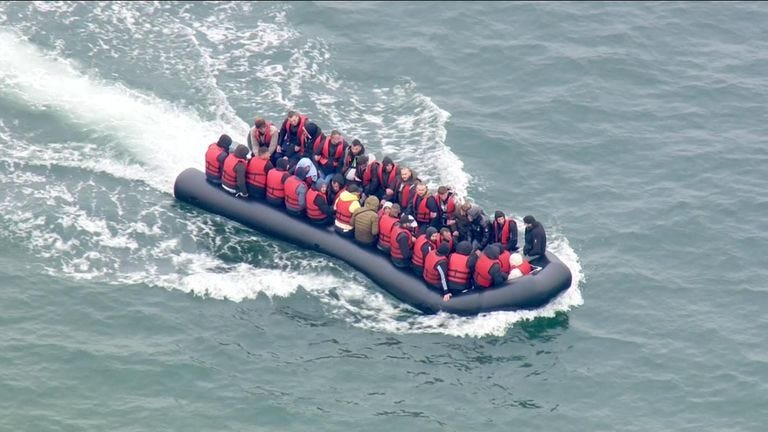Our politics must stop blaming victims
Keir Starmer's immigration policy is more widely applicable, writes George Pitcher
The signs are that Labour leader Sir Keir Starmer is starting to identify some manifesto policies ahead of a general election, other than solely the somewhat underwhelming suggestion that his party won’t be as hopeless as the Tories.
This week, he lands on the issue that is less of a policy area and more of an election trigger warning: Immigration. He didn’t promise safe migration routes to the UK and efficient processing of asylum claims, which many of us might have thought of as a plausible solution.
International co-operation
Instead, he argued that to “smash the gangs” who traffic in desperate people we should adopt processes of international co-operation that we already use to address terrorism and organised crime. This, he evidently hopes, will put clear-blue Channel water between Labour and the Conservatives’ “Stop the boats” slogan.
What he’s doing is endeavouring to disincentivise the criminal traffickers rather than the migrants themselves, who have to date been the focus of Tory policy. In short, this policy would stop blaming immigrants for migration.
This is radical stuff. Not because it’s a particularly innovative policy. Breaking the business model of the small-boat traffickers has long been an intent of the government. But it’s tried to do so by making migrants disinclined to risk the crossing. Labour, by contrast, aims to smash the supply chain rather than reduce the demand.
Gospel in proposal
I don’t suppose this is what drives Starmer’s purpose, but I wonder if there’s gospel in this proposal. And I wonder that because his proposal shifts the focus of blame from desperate and marginalised migrants to those who would exploit them.
Jesus and his disciples, uniquely for their day, didn’t blame the disabled, the lepers, the foreigners and oppressed for their plight. Nor, we should be quick to admit, did they blame the system that put them down. But they were in the business of liberating them from the shackles that held them down, that made them non-people. This was the Christ’s healing.
If politics is about to adopt a framework for immigration that doesn’t blame its victims – and, importantly, provides them with safe and humane routes to have asylum and refugee status efficiently processed – then that is to be welcomed. It’s healing for both victims and the crisis.
Radically human
But to start to look at societal problems globally and to stop blaming victims of crime and, instead, to concentrate on its perpetrators is as radically human as it is simple. And if we were to start doing that, where might it end?
Could we stop blaming the poor for being poor? If so, we might finally depart from the mindset of Norman Tebbit, in the Thatcher government, whose proposed solution to poverty was to get on a bike and look for work. That attitude has bedevilled British politics for the 40 or so years since, even through the Blair years.
Since we’re thinking globally, we might examine how Tebbit’s solution would apply to those impoverished by earthquakes and floods in Morocco and Libya. And, intriguingly, isn’t getting into an inflatable dinghy just a water-borne version of getting on your bike to find work?
Poor always with us
The Nazarene told us that the poor are always with us. That’s not a counsel of despair or an intimation that levelling up would never work, but a recognition that, while many of us are not poor, poverty is owned by all of us. Just as we should stop blaming migrants for their plight and address the causes of that plight, economic policy must address the causes of poverty. Otherwise it isn’t a policy, far less a healing process.
To adopt the primacy of healing is gospel-conscious even if it doesn’t intend to be. To stop blaming victims is to take a first step towards loving them. And, if love is too strong a word for politics, it can simply be about caring about and for them. The principle is widely applicable.
Stop blaming the NHS
We could stop blaming the NHS for not working properly and address what we need from an effective health service (and we shouldn’t be afraid of looking globally to see what that might be). In energy policy, we might cease to blame fossil-fuels or climate activists for inconveniencing us and decide how clean we want our environment to be – that answer dictates action.
The late Robin Cook as foreign secretary argued during the Blair years for an ethical foreign policy – and it didn’t stop his PM bombing and killing hundreds of thousands in Iraq. We might ask instead what a victimless foreign policy looks like. It may not change our support for Ukraine, but it would almost certainly strengthen our opposition to Russia.
A gospel-led approach is one that seeks to be victimless. It’s what we start to see in an immigration policy that doesn’t blame victims. It’s policy that we should support and widen. It’s not just wholesome, it’s holy.
George Pitcher is a visiting fellow at the LSE and an Anglican priest.




